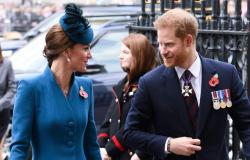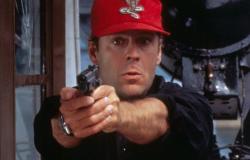There are so many memories, the feelings, that I associate with you and your books that it is very difficult for me to start this letter with the right words, with the precise words. Thinking about it, you are one of the heroes of my childhood, with Tintin and Haddock, and not just about her, about my entire life. You always will be.
It is a great satisfaction for me to write to you because if I stop to think about it I come to the conclusion that you are one of the most important people in my life. It is, of course, Tintin, your creature, who for me is a character that is between reality and fiction, because I have long accepted him as an authentic person, with his peculiar type of reality. Tintin is a great friend to me, and you are too. I remember that I recently participated in a podcast about Tintin, No hair on the bitsand there I said that you had a monument in my soul, and I’m not exaggerating, that’s right.
“I believe that the Tintin stories were the first ones I ever read in my life, except for one Quixote of vignettes that I have already remembered a lot in my writings“
When you died, in 1983, I was very young. He must have been six or seven years old. I can’t forget what my parents, who of course knew my passion for Tintin, told me: “Eduardo, Tintin’s father has died.” And I remember that at that moment I imagined you as a drawing, a drawing like Tintin himself, because if you were his father you had to be like him, a drawing. Some time later, I don’t know how long, I realized that you had drawn him and that you were, or had been, a person of flesh and blood, but that didn’t mean you stopped being “his father,” and I understood it very well. good.
Now I go back to your albums, I review the covers and each one of them takes me back to a moment in my childhood, when they bought me those books and I read them. I believe that the Tintin stories were the first ones I ever read in my life, except for one Quixote of vignettes that I have already remembered a lot in my writings. But my mother bought that book for me, she chose it, while I chose the Tintins myself. and the first The secret of the Unicorn, whose cover precisely caught my attention in a department store. I imagine I was five or six years old, I don’t know, very little. He Quixote My mother started reading it to me out loud without me knowing how to read yet, but I think I already read this Tintin., who already knew how to read, and it seems to me that at my school they taught us to read in preschool, but I’m not very sure. Now I don’t remember exactly when it was, but I do remember wonderfully the letters that the teacher put on cardboard on top of the blackboard so that we could learn them.
I also remember that when I was very little we made a library in class and the teacher told us to bring books from home so that everyone could read them. Then I understood that we had to bring our favorite books, and I brought The secret of the Unicorn and Red Rackham’s Treasure, which from what I could tell were very successful. But my beloved books then seemed to me to have been very mistreated by my companions. Later I found out that they had simply used them, read them. But I must not hide that that was an experience for me, a learning experience, and since then I have had a hard time lending books. I would much rather give them away.
“The boy travels with you and with Tintin and I have felt when moving through the world that I had already been before, with you and with your characters“
I still like Tintin now, perhaps even more than then. Now, when reading comics, in general, I get the feeling that I like them even more. And I read books about these comics that I liked so much as a child, especially Tintin, for example Juan Eugenio D’Ors’ book about Tintin, Hergé… and the others (Libertarian Editions), or that of my friend Rafael Narbona Portrait of teenage reporter (PPC), which is full of originality and information, also of love for Tintin.
Juan Eugenio D’Ors says in his beautiful book that you never understood the success of Tintin. But you also claimed that you dedicated your entire life to him. I believe that in the end things work out when you put so much effort, so much work, so much effort into something. You deserve a huge congratulations, dear Hergé.
But it is also true that, apart from Tintin, you did other very good things, such as Jo, Zette and Jocko, which I really like, with different characters and different stories, but the same impeccable workmanship in the drawings. However, it is clear that you put a lot of effort into Tintin, and your efforts to carefully document them are clearly visible in your albums, especially from The blue lotus, taking trips, taking photographs, reading documents. The boy travels with you and with Tintin and I have felt when moving through the world that I had already been before, with you and with your characters.
A few months ago I wrote a “Letter to Tintin from an old friend”, and there I said that in my opinion the most important character in Tintin was you, Hergé, its creator. I still think about it, although I also believe that you are, if I may say so, behind everything, the drawings, the settings, the characters… without making yourself noticed too much, but always being present. If I remember correctly—I could be wrong—Flaubert said that the writer was in his novel as God behind his creation. It seems to me that Vargas Llosa tells it in The perpetual orgybut I quote from memory, and the memory is not exact, although it is wonderfully literary.
“I have come to the conclusion that your collaborators were precisely that, collaborators, professionals, but that the author of Tintin was you.“
I have also come to the conclusion that your collaborators were precisely that, collaborators, professionals, but that the author of Tintin was you. They, no matter how brilliant they were, carried out assigned work, such as documenting the albums or painting the backgrounds of the vignettes, the sets, etc. but you had created the character, you directed the plays and you drew the characters themselves. As I read in the authors who have written about you and about Tintin, you never wanted to give up that authorship and you always sign the albums alone.
I highly recommend from here those books that I have read, those by Juan Eugenio D’Ors, Fernando del Castillo, Rafael Narbona or Eduardo Martínez de Pisón, which is the last one I read, a few days ago on a trip to Galicia. If you really like Tintin and have read all of his albums, if he has them in his head, he will really enjoy reading about the character and about you, dear Hergé. Furthermore, these writers are very passionate, they feel a passion that they share with the reader, which on the other hand they already feel previously, but which increases, which is a cocktail full of strength. Also, as he says at some point in his book The century of Tintin Fernando del Castillo, every tintinophile in the end claims to be a tintinologist, as an expert on Tintin, with which he dialogues with experts with great ease, even arguing with them, I suppose. Although it is not my case, because I limit myself to enjoying you, Tintin and those who have studied it more than me.


I remember that you said that you were both the father of Tintin and Tintin himself, and I see photos of you when you were young and you look a lot like him. You don’t have his locks on your forehead but rather your hair parted, but his face is similar, round. Many writers resemble his characters. I would dare to say that this is something very normal, although I have observed that authors generally rebel against such similarities or identifications, and it is possible that it is because this can lower the level of their invention, or the quality of that same invention. . If the creature separates itself from the creator it seems like the work wins. I don’t know, in any case I have seen many characters who were very similar to their writers, and it often happens to me too with my characters. They have told me this on quite a few occasions.
“I think the first thing that attracted me to Tintin was the drawing, and specifically the drawing on that cover of The secret of the Unicorn“
Very recently I thought that perhaps one of the reasons why we children liked Tintin so much was because of his appearance, because of his ambiguous age. Tintin looked like us children, but he was also a young man and in some ways an adult. He was like a bridge between us and the future, and it was not difficult for us to identify with him.
But this is an idea that I had when I was older, very recently. I think the first thing that attracted me to Tintin was the drawing, and specifically the drawing on that cover of The secret of the Unicorn, and even more specifically that old ship, it seems to me like a galleon, perhaps a ship of the line. However, more than once I have stopped to review the Tintin covers and I have come to the conclusion that they are all fantastic, very attractive, and that they fulfilled their objective very well: they made you want to buy the books, first, and then read them. But as I say, I think what attracted me most to Tintin, as a child, were the drawings. Or the first.
Today I still enjoy them, and sometimes I think even more. But I also capture with more attention and care all its details, history, documentation, characters, settings, etc. “My beloved details,” which Nabokov said. I seem to remember that he said it about the books he wrote, but it applies very well to the books we read, the texts, in general, that we read. Perhaps literature is in the details, and in them the great writer is revealed. Or the great draftsman, the great creator, like you were, dear Hergé. I always have you in mind, like a great friend, and your books have accompanied me in life since I practically started walking through it. From this humble letter I send you a hug, a hug that travels towards that heaven in which you live. Give another, very large one, to Tintin, Haddock and the rest of our friends, for me, please.
4.3/5
(8 Ratings. Rate this article, please)








